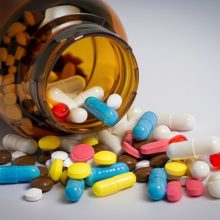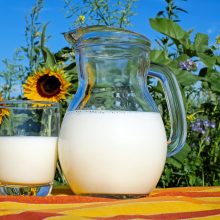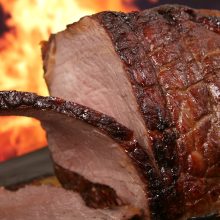How to Supercharge Your Energy (& Beat Fatigue Naturally)
Are you sick and tired of feeling exhausted all the time?
Even after a full night’s rest?
Just crawling out of bed is an effort. Right?
Maybe you find yourself addicted to your daily fix of coffee or one of those sweet-carbonated energy drinks to keep from dragging through your day.
Chances are, they gave you a quick boost of energy. But not for long.
I bet you’ll need more coffee, another energy drink, or some other stimulant in a couple of hours.
These stimulants are only a band-aid solution and won’t provide you with sustainable energy. Worse, they’re bad for your health!
Trust me, I know. Cause I’ve been there.
But one day, I decided to make a change—to put more energy and vitality into my life. And like I did, you can, too, use the same all-natural, life-altering strategies I use.
Generate Boundless Energy
Ditch the Caffeine.
Depending on the brand, an 8-ounce cup of coffee can contain 100 – 380 milligrams of caffeine, while a typical 16-ounce energy drink may contain as much as 350 milligrams of caffeine.
Your body quickly absorbs the caffeine, so it’s used right away. A caffeine crash will likely occur shortly afterward, causing you to crave another cup of coffee, an energy drink, or even a caffeine-laden energy pill.
In other words, your body adapts to caffeine’s effects. So, you need higher and higher doses to get the same effect.
This puts your body under stress, worsens your energy levels over time, and causes a number of other health risks and side effects, including sleep disruption.
Avoid Sugar Like the Plague.
High sugar content is another bad actor to avoid. Besides high levels of caffeine, energy drinks are laden with sugar—even those claiming to be healthier because they contain vitamins and few calories.
Unless you drink your coffee black, several coffee drinks at Starbucks, McDonald’s, Dunkin’ Donuts, and other coffee venues come loaded with sugar.
The belief that sugar gives you instant energy is a myth. What actually happens is that your blood sugar rises when you consume too much sugar. The pancreas then produces insulin to maintain stable blood sugar levels in your body. This leads to a sudden decrease in your blood sugar levels, which causes you to feel tired.
Consuming large quantities of sugar from specialty coffee beverages or energy drinks can lead to an energy crash, which can make you feel sleepy.
On a side note: blood sugar also affects hunger and weight gain, burdens your liver, leads to diabetes, and even feeds cancer cells. Another important reason to reduce your sugar intake.
Natural Energy Boosters Your Body Will Love
Let’s start with some of the most obvious energy boosters . . .
Detox For Energy
Whether you realize it or not, your body swims in toxic chemicals. They get into your body from multiple sources, so there’s no escaping them.
That’s because the world we live in is full of toxins . . .
- Toxic additives in processed foods.
- Pesticides on our fruits and veggies.
- Chemicals in our water.
- Toxic ingredients in body creams, lotions, toothpaste, deodorants, laundry detergents, etc.
- Toxic compounds swimming in the air we breathe.
- Off-gassed chemicals from plastic shower curtains, new cars, plastic food containers, and plastic water bottles.
- Off-gassed toxins in non-stick cooking pans.
- And so much more.
These toxins damage your body. As they build up, they strain your entire metabolism, burden your liver, and lead to chronic inflammation, all of which can reduce your energy levels.
Detoxification can decrease the toxic levels in your body and restore lost energy.
A detox diet or detox cleanse can remove many of these toxins. This helps elevate your energy and restore natural balance so your liver and other organs can function properly and efficiently.
If you want to detox your body, I recommend checking the Internet for local natural health practitioners, naturopathic doctors, or holistic medicine practitioners specializing in detoxification.
Avoid conventional doctors. They do not recognize detox as a valid treatment.
Lower Stress.
Chronic stress can make you feel tired and prevent you from getting a good night’s sleep. So, reducing stress is important for feeling more energetic.
Here are several ways to help you lower stress:
- Exercise can be as simple as daily walks or more involved, like Tai Chi or Yoga.
- Paint or Sketch – puts you in a relaxed state of mind.
- Read – like painting, reading can put you in a relaxed state of mind.
- Breathe – Behavioral expert John Assaraf recommends taking 6 deep rhythmic breaths in through your nose and out through your mouth, like you’re blowing out of a straw. As you breathe in, say, I breathe in calmness, and as you breathe out, say I breathe out stress. Or I breathe in calmness, and I breathe out anxiety.
- Nap – or take small rest breaks during the day when possible.
- Listen to relaxing music – such as meditation or quiet classical music.
- Watch a comedy movie or sitcom – laughter from watching something funny triggers the release of endorphins, the “feel-good hormones.”
- Take a vacation – relieve stress and anxiety by taking a relaxing break.
- Pet an animal – studies show petting an animal cuts down on stress hormone levels.
- Get a massage.
Restore Quality Sleep.
The American Academy of Sleep Medicine and Sleep Research Society recommends we get at least 7 or 8 hours of “quality” sleep per night for optimal health.
Quality sleep is restful and uninterrupted. It allows your brain to go through three stages of non-rapid eye movement (NREM) sleep and one stage of rapid eye movement (REM) sleep, i.e., the dream stage.
If you have trouble falling asleep or staying asleep because of stress, medical conditions, or a poor sleeping environment, you might have insomnia and should consult your doctor for advice.
Want a better night’s sleep? Then . . .
- Go to bed at the same time every night, even on weekends.
- Do something relaxing before bed, such as reading or listening to relaxing music.
- Avoid going to bed hungry or stuffed. If possible, wait at least 3 hours after eating before going to bed.
- Avoid long naps during the day.
- Avoid nicotine, caffeine, or alcohol before retiring for the night. Nicotine and caffeine take hours to wear off and can interfere with sleep. Alcohol can disrupt sleep later in the night.
- Avoid using your computer or smartphone before bed. They emit blue light, which tricks your body into thinking it’s daytime and reduces melatonin, a hormone that promotes sleep.
- Keep your room cool, dark, and quiet for the best sleep environment.
- Expose yourself to sunlight earlier in the day to increase your body’s melatonin levels and help you sleep better. If there’s no sunlight, use artificial bright lights.
- Take a melatonin supplement or one of these other supplements that help you relax and sleep better: ashwagandha, valerian root, magnesium, L-theanine, glycine, and lavender.
Get Your Rear in Gear.
Leading a sedentary lifestyle often results in tiredness during the day.
Studies show that exercise relieves stress and promotes better sleep when done earlier in the day. Avoid exercise before bedtime because it can worsen sleep problems.
You can get exercise in many different ways:
- Daily walks
- Yardwork
- Martial arts
- Working out at a gym or doing body-weight exercises at home.
- Swimming
- Biking
- Tai Chi
- Yoga or Pilates
Drop Those Pounds.
Being overweight or obese can easily lead to fatigue. So, lose those pounds.
While you may consider dieting, diets often don’t work. Many people find that they quickly add back the weight once they reach their weight goal and end their diet.
One option for losing weight is the 16/8 intermittent fasting plan. The plan calls for you to restrict food consumption to an 8-hour period during the day. For the remaining 16 hours, you fast from food.
For example, you skip breakfast and eat only from 10 a.m. to 6 p.m. (an 8-hour period). You fast for the remaining 16 hours (from 6 p.m. to 10 a.m.).
There are several variations of intermittent fasting, which you can check out online. For example, there’s the 14/10 method in which you fast for 14 hours and eat within a 10-hour period, the 12-hour fast, the 24-hour fast, etc.
Another way to lose weight is to regulate what you eat (and shouldn’t eat). Strive to eat organic fruits, lots of organic vegetables, eggs, and protein sources like beans, lentils, wild-caught salmon, grass-fed beef, and organic, pasture-raised chicken.
Avoid fast foods, refined grains, packaged foods, and foods high in added sugars, such as cakes, cookies, and pastries.
Stay Hydrated.
Drink plenty of water throughout the day. If not, you could suffer from dehydration.
Dehydration can reduce your energy levels, make you feel more tired during exercise, and even minimize exercise endurance. It can also cause you to sleep less.
You become dehydrated when you don’t drink enough liquid to replace what you lose in your urine, stools, sweat, and breath. NOTE: Coffee, tea, soda, and alcohol are mild diuretics that remove water from the body and, therefore, contribute to possible dehydration.
So, how much water do you drink?
While some health pundits recommend drinking eight 8-ounce glasses of water daily, no well-researched information confirms that.
It depends more on weight, age, sex, and activity levels. But for a more precise answer, the U.S. National Academies of Sciences, Engineering, and Medicine says men should drink about 15.5 cups (3.7 liters) of fluid daily, while women should drink about 11.5 cups (2.7 liters) of water daily.
But if you feel thirsty, fatigued, dizzy, or get headaches – possible symptoms of dehydration – then, by all means, drink some water.
Here’s what I drink daily for more energy and good hydration: In the morning, I add the juice of a whole lemon to a tall glass of water. In the afternoon, I drink at least two tall glasses of water mixed with two tablespoons of apple cider vinegar.
Both the lemon water and the apple cider vinegar water give me an instant jolt of energy, but they don’t lead to a sudden drop in energy like caffeine.
Bonus: Lemons are rich in vitamins and antioxidants that give you more energy and boost your immune system to fight off colds and flu. Apple cider vinegar also reduces lactic acid buildup in joints, which can sap your energy.
Unleash Your Mighty Mitochondria
Mitochondria, the “energy factory” in nearly every cell of your body, provides 90% of your body’s energy to function. When mitochondria are functioning well, you feel alive and full of energy.
But as mitochondria age or are subjected to toxins, they become weak, damaged, and die off. Your energy then diminishes.
Typically, if you’re 20 years of age, by the time you reach 40, the ability of your mitochondria to produce energy is cut in half. And it plummets another 50% by the time you hit 70.
One of the keys to boosting your energy and overcoming fatigue is supporting mitochondrial health.
So how do you do this? Simple.
Build and protect your mitochondria by consuming healthy foods and specific nutritional supplements, such as . . .
CoQ10 + PQQ
Health experts recommend taking CoQ10 along with pyrroloquinoline quinone (PQQ). Together, they’re a great one-two punch to boost energy and vitality.
CoQ10 supercharges your mitochondria so they function better, while PQQ is the only scientifically proven nutrient to create new mitochondria. NOTE: If you’re taking statin drugs, be aware that they deplete CoQ10 levels, so supplementation with CoQ10 can be critical.
Taken with a meal containing some fat, the standard dose for the ubiquinol form of CoQ10 (which is more bioavailable than the ubiquinone form) is 100 to 200 mg per day. The dose for PQQ ranges from 10 mg to 20 mg. The Life Extension Foundation (lef.org) offers a product that combines both nutrients.
Astaxanthin
A powerful antioxidant, astaxanthin, is the red pigment in various seafood such as shrimp, salmon, and krill. Besides many health benefits, studies show astaxanthin protects mitochondria, enabling it to provide optimal cellular energy production and improve energy levels.
Optimal dosages range from 4 mg to 20 mg per day. The Life Extension Foundation carries this supplement.
Nitric Oxide (NO)
Nitric oxide is a gaseous signaling molecule responsible for various biological activities, including many energy-related functions, such as the production of new mitochondria and the delivery of oxygen to every cell in your body for long-lasting energy.
Endurance athletes claim that because NO gives them more oxygen, they can train harder and perform at greater intensity without tiring.
NO can also help non-athletes. For instance, when you don’t get enough oxygen in your cells because of artery-clogging plaque, this puts a strain on your heart, making you feel more tired.
NO expands narrow blood vessels, eliminates dangerous clots, and reduces plaque – enabling your heart to pump more energy-producing oxygen throughout your body.
Unfortunately, as you age, NO levels in your body diminish. By age 40 or 50, you make about 50% of the NO you did when younger. Fortunately, there are ways to boost NO production naturally.
Exercise and foods like organic arugula, spinach, kale, turnip greens, and beets help elevate NO levels. You can also take NO supplements like Cardio Miracle (CardioMiracle.com), a product containing many natural ingredients scientifically proven to increase NO in the body substantially.
Magnesium, N-Acetyl Cysteine (NAC), and Acetyl L-Carnitine
These three nutrients keep your mitochondria healthy and improve their energy production.
Health experts claim that most people are deficient in Magnesium, an essential mineral needed for more than 300 biochemical reactions in the body. When toxins bombard the mitochondria, diminishing energy production, magnesium works to prevent the drop in energy.
N-acetyl cysteine (NAC), a sulfur-rich amino acid cysteine variant, bolsters mitochondrial function and combats the constant bombardment from toxins.
Acetyl L-carnitine (ALCAR), a form of L-carnitine, is a powerhouse for boosting mitochondrial energy production.
Magnesium can be taken in 200 – 400 mg doses once a day or in divided doses. Since there are several types of magnesium, Organixx (Organixx.com) offers a full-spectrum product with seven types of magnesium plus co-factors for greater absorption.
Standard doses of NAC range from 400 – 600 mg per day, though the dosage can be upped for detoxification or disease protocols.
The standard dose for ALCAR is 500 – 2,500 mg per day, taken in divided doses.
The Life Extension Foundation carries both NAC and ALCAR.
Adaptogenic Herbs
Taking one or more adaptogenic herbs is another way to boost your energy and physical performance. Because these herbs are natural, you can obtain sustained energy without the crash you get from caffeine, sugar, or other stimulants.
Adaptogenic herbs are also great for helping you deal with and recover from stress – which can be tiring and debilitating.
The most popular Adaptogenic herbs include Ashwagandha, Astragalus, eleuthero, Rhodiola, panax ginseng, Schisandra, Maca, Holy Basil, and Licorice Root.
D-Ribose
D-ribose, a special type of sugar found in every living organism, helps replenish ATP (adenosine triphosphate), a molecule essential for boosting cellular energy production and replenishing healthy cellular energy after exercise.
Studies have shown that D-ribose dramatically improves energy levels in people suffering from chronic fatigue syndrome by more than 30%. It also significantly improves the quality of sleep, something that many “tired” persons lack. But get this . . . these studies also show you can attain these improvements in just three weeks.
You can get D-Ribose from The Life Extension Foundation in either tablet or powder form.
R-Alpha-Lipoic Acid (R-ALA)
Alpha-lipoic acid (ALA), a vitamin-like antioxidant that protects against many oxidative processes that harm the body, is gaining acceptance as a “mitochondrial antioxidant.”
R-lipoic acid, however, is now recognized as a more potent and biologically active form of ALA. Scientific evidence indicates that R-ALA repairs mitochondria from free radical damage and optimizes mitochondria functions at substantially lower doses than the synthetic forms of ALA.
R-ALA can be taken in doses of 50 – 300 mg per day, compared to 300 – 600 mg per day of standard ALA.
Glutathione
Cells owe their survival to antioxidants like glutathione to ward off free radical damage. Although cells generate their own antioxidants, not enough are generated to protect them from oxidative stress. As a result, cells need protection from dietary sources of antioxidants.
Glutathione is a major antioxidant that supports mitochondrial resistance to free radical damage during energy production. Although a healthy diet generates glutathione within cells, supplementation helps ensure mitochondrial levels are optimal.
B Vitamins
Your body converts B12 and other B vitamins into energy, helping you overcome fatigue. When you’re deficient in B vitamins, you’ll lack energy.
Foods rich in B vitamins include fish, beef liver, chicken, eggs, beans, spinach, leafy green vegetables, oats, bananas, nuts, and seeds.
If you’re a vegan, you could be deficient in B-12, which is found in animal-based products. Supplementation can help. The Life Extension Foundation has a product containing all major B vitamins.
Banish Fatigue and Tiredness For Good
Imagine waking up feeling refreshed, full of energy, and, as some folks say, “bright-eyed and bushy-tailed.”
You bounce out of bed like a teenager in love. Ready to take on the world.
No longer do you have to drag yourself through the day? Or guzzle cups of coffee and energy drinks for a quick pick-me-up that does more harm than good.
At your job, you find yourself full of vim and vigor. Your boss wonders what happened.
At home, you have the energy to play with the kids, dance around the kitchen with your wife, or get a good workout at the gym.
Sounds far-fetched? No, it’s not.
Start today by simply following the recommendations outlined in this post…
- Avoid relying on coffee or energy drinks that can lead to an energy crash.
- Go on a detox diet or detox cleanse prescribed by a health practitioner specializing in detoxification.
- Strive to get quality sleep.
- Manage the stress in your life.
- Lose weight.
- Drink lots of water to stay hydrated and energized.
- Stay active rather than sedentary.
- Consume healthier foods daily and nutritional supplements that support your mitochondria and naturally boost your energy.
That’s all it takes to feel vibrant and energetic. Now get cracking!




